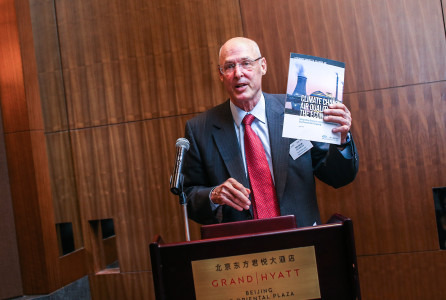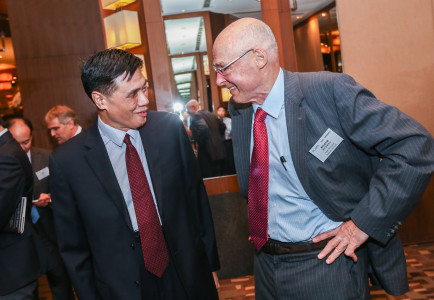
Policymakers and influencers from central government ministries, local government pilots, universities, NGOs and businesses gathered at a reception in Beijing to celebrate the launch of the Stronger Markets, Cleaner Air series of dialogues, publications and policy recommendations. The series – part of the Institute’s Climate Change and Air Quality Program – is centered on the topic of how market forces, working in tandem with environmental laws and enforcement, can support China to meet and exceed air quality and climate goals. The Paulson Institute hosted the reception in partnership with the China Center for International Economic Exchanges (CCIEE).

“The inspiration for this series came from my discussions with top leaders here in China, who were interested in better understanding how the concept of sustainable economic growth plays out on the ground, and in particular here in the Beijing-Tianjin-Hebei region,” Paulson Institute Chairman Hank Paulson said. Explaining why the Institute chose to focus on market forces, Paulson said, “Markets accelerate transformation and are low-to-no cost to the government.”
The reception also marked the publication of a background report that sets the stage for the series. Entitled Climate Change, Air Quality and the Economy: Integrating Policy for Economic and Environmental Prosperity, the report lays out some of China’s key air quality and climate challenges and opportunities. More detailed policy papers will be released throughout 2015 on the topics of power sector reform, demand response systems, building energy disclosure, and carbon emissions trading. In the fall, the Institute will release a report that makes the case for sustainable economic growth in the Beijing-Tianjin-Hebei region in particular, arguing that an improved environment will help pave the way for a stronger economy. The report will provide case studies from other cities that have transformed their economies away from heavy industry while continuing to grow GDP and create jobs – such as Pittsburgh, Cleveland and the Ruhr Valley in Europe.
“China is making many of the right moves, and translating those into action is key,” Paulson said. “We offer the Paulson Institute’s support and assistance in implementing China’s aggressive and essential agenda.”





